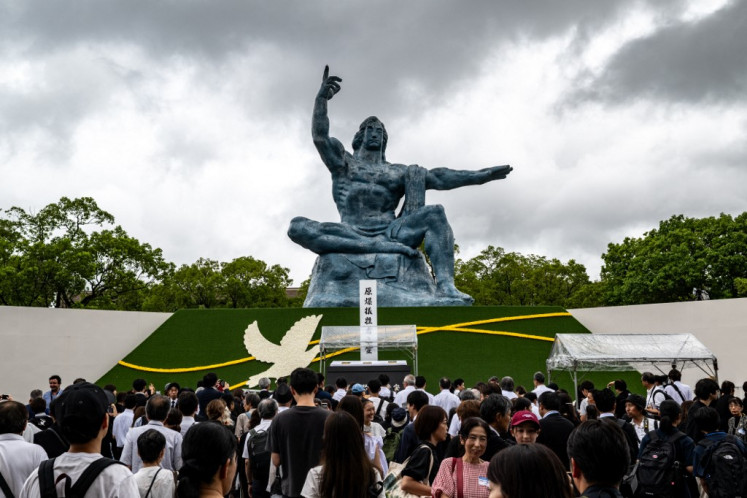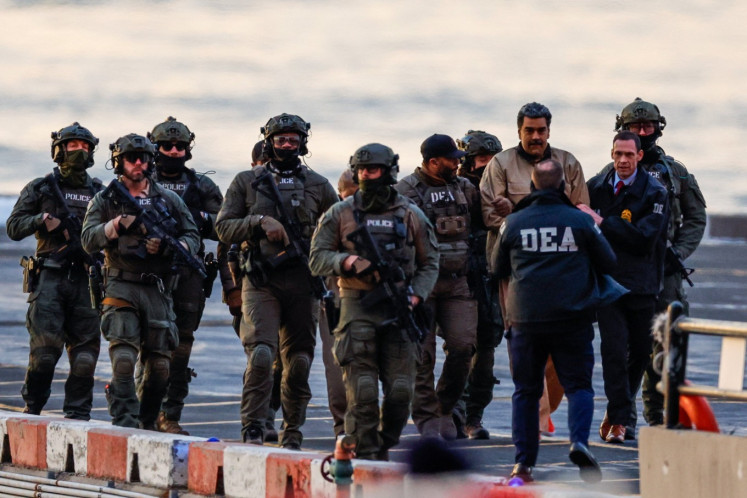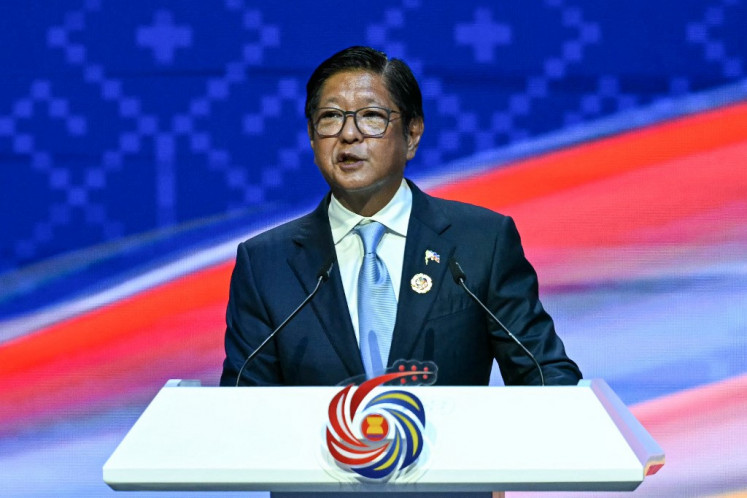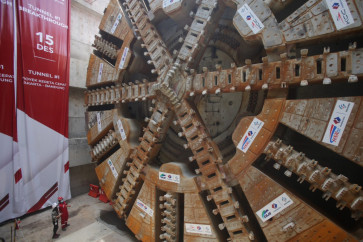Popular Reads
Top Results
Can't find what you're looking for?
View all search resultsPopular Reads
Top Results
Can't find what you're looking for?
View all search resultsAnalysis: Ahead of Xi’s arrival, cost overrun has yet to be settled
The Jakarta-Bandung high speed railway (HSR) test run with Chinese President Xi Jinping is only a month away, yet the project’s cost overrun has yet to be settled.
Change text size
Gift Premium Articles
to Anyone
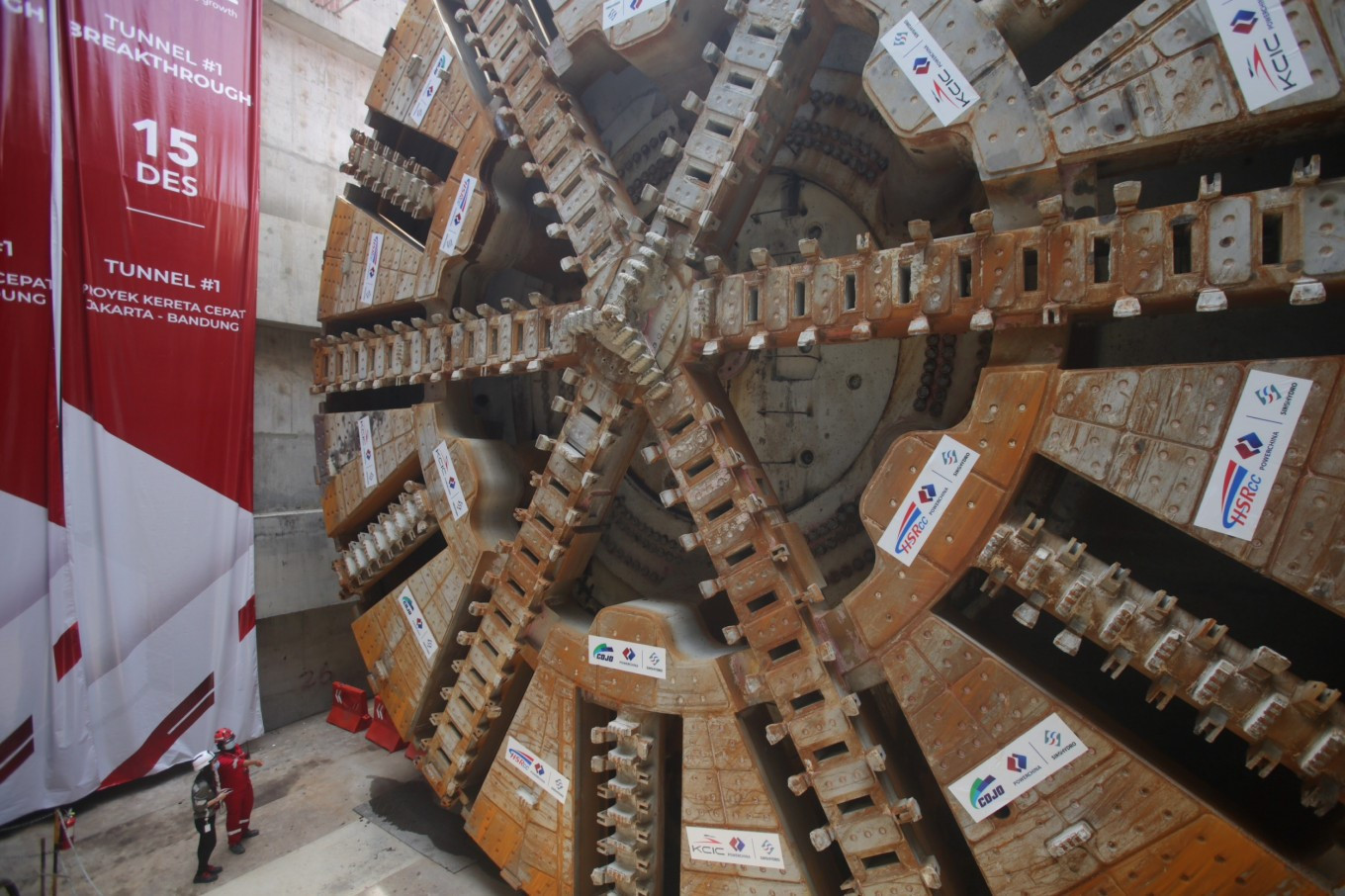 Officers check the condition of the Tunnel Boring Machine (TBM) for the Jakarta-Bandung Fast Train Project in Tunnel 1 in the Pondok Gede area, Bekasi DKI, Tuesday, 12/15/2020. The TBM machine has managed to penetrate the tunnel 1 tunnel structure along the 1.8 KM transverse under the Jakarta-Cikampek toll road. (JP/Wendra Ajistyatama)
Officers check the condition of the Tunnel Boring Machine (TBM) for the Jakarta-Bandung Fast Train Project in Tunnel 1 in the Pondok Gede area, Bekasi DKI, Tuesday, 12/15/2020. The TBM machine has managed to penetrate the tunnel 1 tunnel structure along the 1.8 KM transverse under the Jakarta-Cikampek toll road. (JP/Wendra Ajistyatama)
T
he Jakarta-Bandung high speed railway (HSR) test run with Chinese President Xi Jinping is only a month away, yet the project’s cost overrun has yet to be settled. In the most recent audit, the Chinese and Indonesian sides calculated different cost overruns. A spokesperson for the Development Finance Comptroller (BPKP) said the difference was quite significant.
The HSR project is in need of additional funding to cover the overrun cost incurred from the project delays, which is expected to come from a state capital injection (PMN) and a loan from the China Development Bank (CDB) (Read: Jakarta-Bandung HSR faces another delay, unresolved cost overrun). However, from the perspective of the CDB and the Chinese state-owned enterprise (SOE) consortium, it appears as though Indonesia is exaggerating the value of the cost overrun. Since there has been no agreement on the value of the overrun cost, it prevents both funds from being disbursed, risking another delay so close to Xi’s visit.
The first audit assertion in the first quarter of 2022 estimated the overrun to be US$1.2 billion. Then, the second audit assertion in the third quarter of 2022, came out with even bigger number. The full report for the second audit is not yet available and is pending review from an arbitrator. However, sources said the second audit estimated more than a US$1.4 billion cost overrun, which includes additional construction costs, taxes and the relocation of public facilities. Changes in component prices for engineering, procurement and construction may even cause the estimate to reach US$1.9 billion. By comparison, the cost overrun estimated by China was US$982 million.
PT Kereta Cepat Indonesia Cina (KCIC) secretary Rahadian Ratry confirmed that there was a difference between how China and Indonesia calculated costs. The main cause of the discrepancy was differences in the assumptions and methods. For example, China assumed that the GSM-R frequencies, which are used for signaling trains, were free like in China. However, GSM-R in Indonesia is provided through a frequency sharing program with Telkomsel, which is not free and has an investment cost.
In a hearing with the House of Representatives last July, PT Kereta Api Indonesia (KAI) president director Didiek Hartantyo said the company had only US$771 million as of September 2022. However, the projected cash outflow for the fourth quarter of 2022 was US$ 1.46 billion, which meant that the project was short US$689 million to continue construction up to the end of the year.
In preparation for the test run, KCIC has recently completed the track laying phase in Depo Tegalluar station, which is where the test run will be held. The test run will use an inspection train with a speed cap of 80 kilometers per hour. The test run itself is an isolated process, which means builders don’t need to connect Tegalluar station to any other station.
Transportation Minister Budi Karya Sumadi is confident that the HSR will be ready in time for the November 2022 test run with President Xi Jinping and that the project can still meet its June 2023 deadline for full operation.





